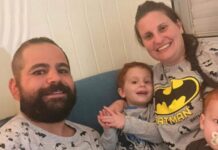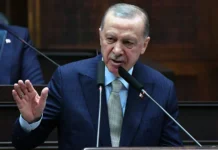Yaakov is forced to leave his parents’ house in the city of Be’er Shevea (“באר שבע”), and go towards Rivkah’s wicked brother, Lavan’s house in Charan (“חרן”). The name Charan means anger, alluding to how much HaShem was angry with this city as they were all idol-worshipers. We notice that the Torah adds the letter “Hei” (“ה”) to the city’s name and it is now called “Charana (“חרנה”). Now that Yaakov is going there, he will have HaShem’s help. Since he was a righteous man (“Tzadik”) who comes to the city, the city will be blessed. It is worth mentioning here that Avraham named the city (that Yaakov was leaving) when he made a convent with Avimelch as it says (Beresheet 21:31), “and he named that pace Be’er Shevea” (“על-כן, קרא למקום ההוא–באר שבע”). In our first verse three words “וַיֵּצֵא יַעֲקֹב, מִבְּאֵר שָׁבַע” there are 15 letters alluding to the 15 years our three forefathers lived and learned Torah together.
The questioned was asked why the Torah mentions where he leaves from and where he is going to? We already know that he lived in Be’er Sheva. This comes to teach us that when a Tzadik leaves the town the town becomes much less holy and loses its blessings and illumination. Our Sages say that when a Tzadik leaves a town the glory and the splendor of the town disappear with the departure of the Tzadik and it becomes a desolate place. We know that to be true as we read in the Torah about many Tzadikim, as well as our Forefathers. We also learn this teaching from our own history as by being in exile, our Holy Land was desolate for about 2000 years. Only when the true Tzadikim came back to her, did Israel become fertile again.
Yaakov left his home secretly, which also symbolizes the decent of the Jewish people into exile. Eisav heard about it and sent his son Eliphaz (“אליפז”) to chase and kill Yaakov. Eisav told his son that Yaakov stole his firstborn rights and if he kills him he will merit receiving the blessings of the firstborn. Eliphaz asked his mother, Adah, for her opinion about killing Yaakov; his mother was a wise woman and she advised him against it. She used the reasoning that his father Eisav failed to do so, and most likely he will fail too as HaShem is with Yaakov. The Zohar teaches us a profound understanding about Yaakov “bought” the “Bechorah” from Eisav. The Zohar explains that Yaakov didn’t buy the “first-born” rights, rather he bought the rights to marry Leah, who was the “Bechorah”, who originally was destined to marry Eisav. Laven had two daughters, Leah and Rachel. Rivkah his sister had two sons, Yaakov and Eisav. They arranged marriage accordingly, older to older (Leah to Eisav) and younger to younger (Rachel to Yaakov).
The Midrash tells us that when Eliphaz finally caught up with Yaakov he told him of his mission. Yaakov persuaded him not to follow his wicked father’s orders to kill him and gave him all of his possessions, saying to Eliphaz that a poor man is considered like a dead man. Eliphaz agreed and went back to his father’s house. Eliphaz grew up with his grandfather Yitzchak and understood kindness; Yaakov was aware of this and used it to influence him. The Midrash says that Yaakov gave up even his cloths and was hiding in a river. HaShem made a miracle and a horseman fell into that river and drowned, and Yaakov took his cloths. The Midrash also teaches us that Yaakov was afraid that the horseman’s family will think that he killed him and went to the Bait-HaMidrash of Shem and Ever and studied Torah for fourteen years (same number of years he waited for Rachel). It is impotent to know that Eliphaz (“אליפז”) Esau’s son also had a concubine named Timna, who bore him Amalek. Eliphaz was the first-born son of Esau by his wife Adah. Eliphaz had six sons, from which Omar was the firstborn, and the others were Teman, Zepho, Gatam, Kenaz and finally Amalek.
Mark Twain, one of America’s greatest authors, who originally was not “fond” of the Jewish people, changed his mind after visiting Eretz Yisrael. He wrote: “If the statistics are right, the Jews constitute but one percent of the human race. It suggests a nebulous dim puff of star dust lost in the blaze of the Milky Way. Properly the Jew ought hardly to be heard of, but he is heard of, has always been heard of. He is as prominent on the planet as any other people, and his commercial importance is extravagantly out of proportion to the smallness of his bulk. His contributions to the world’s list of great names in literature, science, art, music, finance, medicine, and abstruse learning are also way out of proportion to the weakness of his numbers. He (the Jewish people) has made a marvelous fight in the world, in all the ages; and has done it with his hands tied behind him. He could be vain of himself, and be excused for it. The Egyptian, the Babylonian, and the Persian rose, filled the planet with sound and splendor, then faded to dream-stuff and passed away; the Greek and the Roman followed, and made a vast noise, and they are gone; other peoples have sprung up and held their torch high for a time, but it burned out, and they sit in twilight now, or have vanished. The Jew saw them all, beat them all, and is now what he always was, exhibiting no decadence, no infirmities of age, no weakening of his parts, no slowing of his energies, and no dulling of his alert and aggressive mind. All things are mortal but the Jew; all other forces pass, but he remains. What is the secret of his immortality?” He once said that if you want to know if God is real, the Jews are the proof!
In the second verse it is written that Yaakov “encounter the place” on the same day. The Midrash says that the trip usually took seventeen days and Hashem made a miracle and it only took twelve hours. Yaakov “hit” the place, means he came across the place. The Midrash tells us that he first passed the “Place” (“מקום”), referring to Mount Moriyah (“הר המוריה”). The Midrash says that Yaakov kept walking and forgot to daven. This “Place” is where his father, his grandfather and Noach offered sacrifices to HaShem and where the Bait HaMikdash will be built. He then realized that he must go back to pray to HaShem. Another Midrash says that the “Place”, also means HaShem, came to him to Yaakov.
The Kabbalah says that when the Torah writes (Beresheet 28:11), “and he touched the “makom” (place) and rested there”, it comes to teach us that, that night Yaakov touched, attained and connected to the level of Malchut of Atzilut, which is known as “Makom” and the place of Beit-Hamikdash.
We learn that while going to the “Place”, Yaakov would be absent from his parents for 36 years all together. In the second verse 11: “וַיִּפְגַּע בַּמָּקוֹם וַיָּלֶן שָׁם, כִּי-בָא הַשֶּׁמֶשׁ, וַיִּקַּח מֵאַבְנֵי הַמָּקוֹם, וַיָּשֶׂם מְרַאֲשֹׁתָיו; וַיִּשְׁכַּב, בַּמָּקוֹם הַהוּא” the word “Makom” “מקום” (place) is mentioned three times, to teach us about the three Bait HaMikdash who will be built there and of its importance and its holiness:
- Bait HaMikdash בית המיקדש
- Jerusalem ירושלים
- Place of Sacrifices העקידה מיזבח
Our Sages say that the words “since the sun came” (“כִּי-בָא הַשֶּׁמֶשׁ”) allude to change in nature. HaShem wanted to talk to Yaakov in a prophecy through a dream and made the sun set earlier than usual in order to appear to him. Yaakov prepared twelve stones to surround his head. He did not fear for his body, only for his soul; that is why he put the stones around his head. The question was asked why twelve stones, and not another number. The Midrash says that Yaakov knew that he will have twelve tribes/children and wanted to see how they (the stones) will act together while he is asleep. We learn that they all became one as it will be in the future; alluding to the same unity they had at Mount Sinai when they received the Torah. We also know that from here Yaakov davened Maariv (“מעריב”) before he went to sleep.
Yaakov fell asleep and had a prophetic dream called “Yaakov’s Ladder” (“סולם יעקב”). The Torah writes that he first fell asleep and the sun sets, but it should have been the opposite. Rashi explains that HaShem made it this way in order to have him stay on Mount Moriyah “הר המוריה”. We also learn from here that a person should not travel at night and should arrive at a place prior to sunset.
The Gemara teaches us that the word “Even” (“אבן” – stone) stands for three portions of Masechtot that every person should learn from:
- Avott – Ethics of The Fathers – אבות
- Brachott – Blessings – ברכות
- Nezikin – Damages – נזיקין
The Midrash says that Yaakov learned these entire three Gemara masechtot prior to going out to another city, in order not to sin in any of these laws and to be able to deal with Lavan and his people. We learn that from verse 16: “וַיִּיקַץ יַעֲקֹב, מִשְּׁנָתוֹ”, and Yaakov finished his Mishnah.
Yaakov dreamt of Angels going up first and then coming down the ladder. Common sense tells us that Angels should be coming down from the heavens to earth and not the opposite. The Midrash says that because he was such a holy man in such a holy place the good Angels were already there in the place of the Bait HaMikdash and Jerusalem, to protect Yaakov. Rabbi Meir Eliyahu says that when Yaakov came to Temple Mount HaShem turned off the sun, as the verse says “וַיָּלֶן שָׁם, כִּי-בָא הַשֶּׁמֶשׁ”; the words “Ki Ba” mean turned off. We also learn that the word “Even” (stone) is an acronym to “Av” (father), “Ben” (son), and “Neched” (grandson). This acronyme alludes to a profound promise by HaShem that if three generations learn Torah together, then the Torah will never leave that family. Meaning they will always be involved in Torah and be blessed for generations to come.
Yaakov had a vision (prophecy) in his dream of the good Angels going up and not returning back, and the bad Angels coming down. He saw Moshe (“משה”) and Korach (“קורח”) fighting and Israel’s enemies going up and down, symbolizing greatness and demise, the rise and fall of the Jewish nation and its people. Yaakov had another vision of his brother Eisav going up the ladder and not coming down and he was extremely worried. The Torah writes that HaShem was “standing above him” (“נצב עליו”), as he was a great Tzadik (“צדיק”), same as was done for his grandfather Avraham, when HaShem and the Angels were “standing above him” in Parashat Lech Lecha. Yaakov was a prophet and HaShem spoke to him directly and promised him that the place and land that he slept on will forever belong to his offspring, the Jewish nation.
Our Sages explain the verse “The land upon which you lay, I am giving to you and your descendants” (Beresheet 28:13). What kind of gift is the space of four cubits as an inheritance? The Midrash says that HaShem folded the whole land of Israel and placed it under Yaakov’s head, to indicate to him that the conquest of the entire land will be as simple as conquering four cubits” (Chullin 91b). From here we should deduce that had HaShem not folded the land underneath Yaakov, we would not be able to conquer it. This is the same promise HaShem made to Avraham at the Covenant, as it says, “on that day HaShem made a covenant with Avraham saying, for your descendants I have given the land” (Beresheet 15:18).
This blessing had a bad prophecy in it. HaShem said “and I shall return you to this land…”, referring to the exile of Bnei-Yisrael in the future. Yaakov woke up and understood that this place is the Holiest of Holies and that the Shecinah will forever rest upon it. Yaakov named the place the house of God (“בית אל”) and the Heaven’s Gate (“שער השמים”). The word “סולם” – Ladder is 136 in numerical value and equals to “Kol” – “קול” “Tzom” – “צום” and “Mamon” – “ממון”. With all we will be praying, fasting and giving charity and help us with removing a bad decree. The numerical value of each of these three words is 136.
Yaakov made a covenant with HaShem in order to secure the future of the Jewish people for generations to come. According to our Sages Yaakov asked HaShem to “protect” him from transgressing the prohibitions of the Torah; give him “food”, meaning to help him study the Torah; give him a “garment to wear”, meaning to cover him with Mitzvot; and to “return him safely” to his father’s home, meaning to return the sparks of holiness to their source with the coming of Mashiach. Yaakov then will reap the gains for his soul, and will spread HaShem’s word to all the nations. Yaakov wanted to make sure that this moment will be recorded in the Torah for the sake of Bnei-Yisrael.
Following the covenant with HaShem, Yaakov continued on his trip. The Torah writes the word “VaYisa” (“וישא”), which means he now found his entire journey easy to handle. His prophecy comes true, and HaShem is with him. The Midrash says that five miracles happened to Yaakov on his way to Charan:
- A trip that was supposed to take 17 days took 12 hours (he arrived on the same day like Eliezer).
- The sun set earlier than usual on Mount Moriyah.
- The 12 stones became one stone
- When he arrived at Charan at the water-well he removed (by himself) a giant rock that usually took many shepherds to move.
- The water in the well rose and irrigated the fields of Charan by itself
Yaakov arrived at a place (by Charan) name Bnai-Kedem (“בני קדם”) which means the people of the older times; to teach us that these people belonged to the family of his mother and his grandfather. He met three groups of shepherds herding flocks by the water-well. Interestingly enough the Torah calls the shepherds group cattle’s; to teach us that they took care of their flocks with love and compassion.
Yaakov saw Rachel for the first time and a miracle happened. He removed the giant rock all by himself effortlessly, while speaking to Rachel. The water rose and watered all her sheep, all the other flocks, and the entire land surrounding the well. The Midrash says that new plants grew instantly and everyone saw that Yaakov was a righteous man, just as HaShem promised him by adding his letter “Hei” (“ה”) to city’s name to be read Charanah. The word well (as water-well) was mentioned seven times in these verses, alluding to the 7 seven wells Avraham dug in Be’er Sheva.
Yaakov saw that HaShem kept his promise to him, and he immediately understand that Rachel was to be his wife. The Torah writes that Yaakov did something very strange; he kissed Rachel and cried the very moment they met. Why did Yaakov kiss her and cry? The Midrash says that Yaakov had a prophecy that Rachel will die and would not be buried with him, so he wept loudly. He understood that she was his true match (soulmate) from HaShem, and wanted to be with her in both worlds.
Yaakov told Rachel that he is her father’s nephew and his mother is Rivkah. Rachel ran to her father and told him all about Yaakov and all that had happened at the water-well, and the miracles she witnessed. The reason Yaakov emphasized that he is Rivkah’s son was in order to warn Lavan not to cheat him. Lavan ran towards him hoping to receive gifts just as Eliezer gave his sister Rivkah. Yaakov also told Rachel that he is her father’s brother; this was odd, as he obviously was not. This comes to teach us that he warned Lavan that if he cheated him, Yaakov will act with the trickery of a brother, meaning like Eisav. Lavan was very greedy and thought that Yaakov was rich as his father and his grandfather. The Midrash says that Lavan looked for treasure on Yaakov after hugging him and even kissing him to see if he was hiding jewels in his mouth.
Lavan finally understood that Yaakov had nothing to give and he was poor by earthly terms, and he brought him into his house. Yaakov told Lavan all about what happened with his brother Eisav; what happened with Eliphaz, Eisav’s son, and how he had lots of wealth but had to give it away. The Midrash tells us that Lavan “hosted” Yaakov for a month but demanded that he would work in order to pay for his stay.
We learn about Lavan’s cunning ways when he told Yaakov “you are my family…” yet asked “what would be his pay” for staying at his home. Lavan had two daughters; the older one Leah (“לאה”) and the younger one Rachel (“רחל”). The Torah writes that Leah’s eyes were “tender”, meaning she was crying a lot. The Midrash says that, being the older sister, Leah was destined to marry Eisav. However, she did not want to marry Eisav and she prayed all the time while crying to HaShem not to have to marry the evil Eisav. Rachel was beautiful and had beautiful complexion. The Midrash compares Rachel to a righteous woman who always lives a holy life; while Leah was compared to a woman of Teshuvah (“תשובה”) who elevates the non-spiritual world to holiness.
Lavan “Ha-Ramai”, the cheater, made a strange statement, saying to Yaakov, “Nevertheless, you are my brother” (verse 29:14). The word “Nevertheless” (“Ach” – “אך”) in Gematria is 21, alluding to the number of years Yaakov stayed with Lavan. Lavan cheated Yaakov and on the wedding night he exchanged Rachel with Leah and brought Leah to Yaakov instead of Rachel. The Midrash says that Rachel agreed to the exchange out of love and respect for her older sister. The Midrash also says that Yaakov and Rachel had a secret code word since they knew that Lavan was a cheater. Rachel gave this code to Leah that night, so she can use it and not be embarrassed by Yaakov. This was the explanation as to why Yaakov did not realize that Leah was with him during the night; however, at daylight he realized that it was not Rachel. Lavan also gave Yaakov Leah’s maidservant named Zilpah (“זילפה”), who later also bore children to Yaakov.
Rachel was so righteous that she gave Leah the secret code and the merit to be Yaakov, since she was her older sister. HaShem rewarded Leah with marrying Yaakov, who was a Tzadik, for she was always praying to HaShem. Because of her great Mitzvah Rachel merits that from her son’s offspring will be the builder of Bait HaMikdash בית המיקדש and kingship for Beni-YIsrael.
In the morning Yaakov realized that he was cheated and asked Lavan why. Lavan justified his actions by telling Yaakov that he too cheated his brother Eisav and he is now being dealt with the same act. Lavan also told Yaakov that in his city they never give away the young one before the older one is married first. Yaakov asked Leah why she answered him last night while calling the name Rachel, pretending to be her. She answered that she learned that from him in the name of HaShem as he pretended to be Eisav when his father called him for the blessings. In verse 29:23 there is code and a fulfillment of a Mitzvah that was commanded by Yaakov’s parents within the sentence “and he took Leah”. We know that Yaakov left his parents and was absent for 36 years, as they sent him away to marry a righteous woman. The name of his first wife is “Leah” (“לאה”); the numerical value of this name is 36, same as the number of years he was absent from his parents.
Lavan made another arrangement with Yaakov, who agreed to work an additional seven years for Rachel. The question is how can Yaakov be allowed to marry two sisters, as it is against the 613 laws of the Torah? Ramban says that this law only applied in the land of Israel (Rashi disagree with the Ramban). Chizkuni explains that the two sisters ceased their sisterhood after Rachel, the righteous, gave Leah the secret code and let her marry first. Another source says that HaShem ordered Yaakov to marry two sisters in order to have the twelve tribes, as he was in his mid-eighties.
Yaakov worked for another seven years for Rachel and the Torah writes that it was like a week in his eyes, and he finally marries Rachel. Lavan also gave Yaakov Rachel’s maidservant named Bilhah (“בילהה”), who later also bore children to Yaakov. The law today forbids one man to marry two sisters, as Yaakov did.
Within seven years Yaakov had eleven children.


























